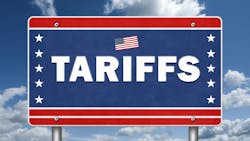Tariffs Reshape Supply Chains in Unpredictable Ways
Tariffs are having a major impact on the supply chain. Already, supply chains are being tasked to absorb some, if not all, the costs of tariffs. Since the first tariffs of the Trump 2.0 Administration were imposed, import volumes have dropped 35% since March, while Ford is hiking prices $2,000 on autos built in Mexico.
Edward Anderson, Mortimer Centennial Professor of Business at Texas McCombs and researcher with the University of Texas Supply Chain Management Center, offers an analysis of the myriad effects tariffs will continue to have on the supply chain.
What’s the purpose of imposing tariffs?
Historically, they were used to raise money to run the government. Until the income tax came in, they were one of the major income streams. But now, they’re really a tool of trade policy.
How do tariffs as trade policy affect supply chains?
There’s a shock at first from a new tariff, but then, supply chains may be adjusted. For instance, you can move some things that are being produced in China. Right now, Apple is moving their iPhones to India, which will probably have a lower tariff rate.
But actually, things have been moving out of China for a while, partly because their wages have gone way up. Like with garments. Really high-end garments tend to still be made in China. But low-end things like athletic wear are now getting made in Bangladesh.
Who really pays tariffs? Companies or consumers?
Here are some numbers. If you’re Mattel, and you’re getting a Barbie doll made in China, and it’s sold in the U.S., most manufacturing companies only have profit margins of 5% to 10%. If you raise tariffs to 145%, and Mattel keeps selling every Barbie at the same price, they’re losing money every time they make a sale. So yes, it’s got to be passed on to the customer. [Note: Mattel is raising prices in response to tariffs.]
Do higher rates on imports promote reshoring, bringing manufacturing home to the U.S.?
There are challenges. One is the time it takes to build a plant. You might be looking at only 2 to 3 years once you break ground. The bigger problem is buying the land in the first place. And then, you’ve got to pass regulatory hurdles, such as zoning and environmental impact, and often, lawsuits by people who don’t want you to build a plant near them.
Another challenge is that if you want to build a lot of factories, you need skilled labor. According to some estimates, we probably don’t have enough people to build them all simultaneously.
You also need the know-how to manufacture. We’ve been offshoring for about 30 years, and a whole generation of knowledge is gone. For instance, we got out of the shipbuilding business in the U.S. a couple of decades ago. Now, we don’t have any engineers, skilled tradespeople, or workers who know how to build ships. They’ve all retired or passed away.
Do uncertain supply chains mean we’ll see empty shelves again?
In the short run, it’s possible if demand ramps up suddenly and the ports get clogged up. When ports get really full, their ability to offload ships actually drops, oddly enough. But long term, the real issues are going to be more about prices than shortages.
Different products will be affected differently. Toy prices will probably go up. Food that comes from outside the U.S. might get more expensive, like bananas and pineapples. A lot of electronics will go up, particularly on the low end.
But most of our food is grown in the U.S. In fact, our food supplies may ultimately go up because we won’t be shipping as much to China, which has enacted retaliatory tariffs against us. So, demand will be less, and overall food prices might potentially go down.
Right now, many U.S. tariff rates are changing from month to month. How does that uncertainty affect supply chains?
Most tariffs, once they’re put into place, just stay forever, until something is done to actively adjust them, either by Congress or the president. So, uncertainty can be a problem.
Right now, the uncertainty is paralyzing everything. That’s why we’re seeing a drop in incoming shipments into the U.S. Why bother shipping stuff now if you might get a lower tariff rate when things settle down?
It’s also impacting investment, because companies are unwilling to build plants, or even adjust their current supply chains, until they know what the tariff regimes are going to be.
